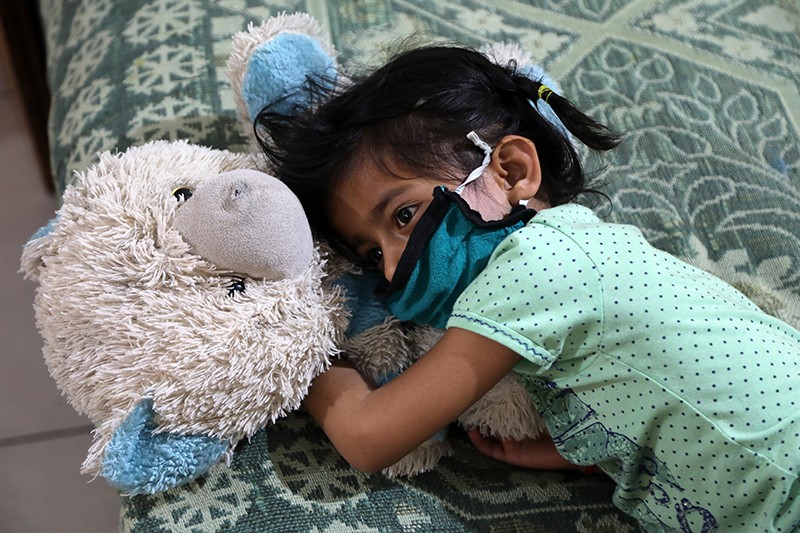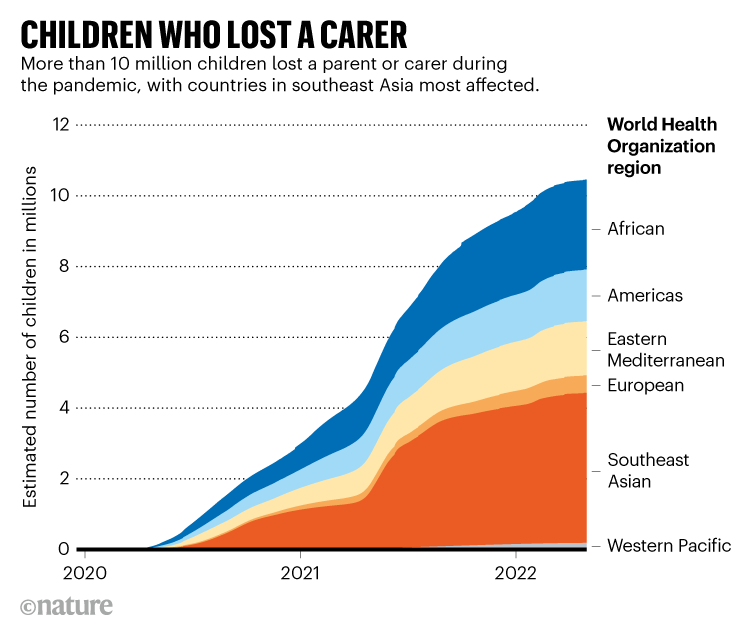[ad_1]
Roughly 10.5 million children worldwide have a parent or carer who died from COVID-19, according to a modelling study1. The figure is a dramatic increase on earlier estimates. India, Indonesia and Egypt were the countries most affected; other regions throughout Africa and southeast Asia were also badly hit.
The study, published on 6 September in JAMA Pediatrics, is the third update of the number of children left orphaned because of the pandemic.
“I really appreciate this team’s effort to try to keep the issue of COVID-related orphans in front of the research and policy communities,” says Michael Goodman, an applied social epidemiologist at the University of Texas in Galveston. “We as a research community, as policy influencers — we as a society are not off the hook for these children.”
Earlier studies estimated that around 1.5 million children under 18 years old had lost a primary or secondary carer during the first 14 months of the pandemic. A year later, estimates are an entire magnitude greater, says co-author Susan Hillis, an epidemiologist at the University of Oxford, UK. This number stacks on top of the 140 million children who were already orphans before the pandemic, she says.
To create their estimates, the authors factored in excess- deaths data from the World Health Organization, the Institute for Health Metrics and Evaluation in Seattle, Washington, and The Economist and fertility rates — which gave them an idea of how many children were affected by each death in a given country. Excess deaths are the difference between anticipated and observed deaths in a given period, in this case from 1 January 2020 to 1 May 2022.
The model suggests that 7.5 million children lost one or both parents, while 10.5 million children lost parents or carers. Hillis says that the estimates of children orphaned increased as more COVID-19 testing became available, and as more lower- and middle-income countries reported data throughout the pandemic.
“For the child, it doesn’t matter to them at all what killed their parents,” says Hillis. “It matters to them that their parents are dead.”
Life-long consequences
Losing a parent or carer can inflict life-long consequences on children; on top of their traumatic grief from the loss, orphaned children are more likely to experience mental-health problems, abuse and chronic illness. Despite the heartbreaking situation, Hillis says that governments and communities can make a difference if they act in time. She urges people to check in on children they know who lost a parent, and on families with kids.
She adds that decades of research on children whose parents died from AIDS shows that three ‘accelerators’ are the foundation to helping children to recover: educational support, economic assistance and assistance for the remaining parent or carer. Identifying the children who need help, and providing it quickly, is “where we need to go on the action”, Hillis says.
So far, only the United States and Peru have made commitments to support children orphaned by COVID-19, but Hillis is working on bringing the research to the attention of more policymakers around the globe.
In the United States, one in five adults who have had COVID still have long COVID, and Goodman notes that up to four million adults could be out of the workforce as a result. More data is needed, not just on orphaned children but on those whose parents have lost some caring capacity owing to long COVID, and on how to support these children.
“We need to make sure that we don’t stigmatize youth who are undergoing really incredible loss, as though they could only be defined by that loss,” Goodman says. “Children and youth are not just vulnerable people. They are resilient people.”
[ad_2]
Source link



